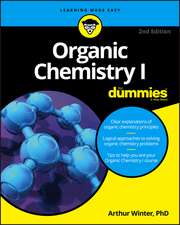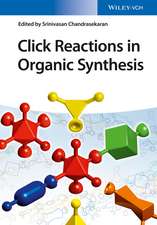Aromaticity in Heterocyclic Compounds: Topics in Heterocyclic Chemistry, cartea 19
Editat de Tadeusz Marek Krygowski, Michal Ksawery Cyranskien Limba Engleză Hardback – 29 ian 2009
| Toate formatele și edițiile | Preț | Express |
|---|---|---|
| Paperback (1) | 1546.07 lei 38-45 zile | |
| Springer Berlin, Heidelberg – 19 noi 2010 | 1546.07 lei 38-45 zile | |
| Hardback (1) | 1828.11 lei 6-8 săpt. | |
| Springer Berlin, Heidelberg – 29 ian 2009 | 1828.11 lei 6-8 săpt. |
Din seria Topics in Heterocyclic Chemistry
- 18%
 Preț: 1817.08 lei
Preț: 1817.08 lei - 18%
 Preț: 1226.90 lei
Preț: 1226.90 lei - 18%
 Preț: 1226.73 lei
Preț: 1226.73 lei - 18%
 Preț: 1218.53 lei
Preț: 1218.53 lei - 18%
 Preț: 1217.27 lei
Preț: 1217.27 lei - 18%
 Preț: 1821.03 lei
Preț: 1821.03 lei - 18%
 Preț: 1823.39 lei
Preț: 1823.39 lei - 18%
 Preț: 1819.77 lei
Preț: 1819.77 lei - 18%
 Preț: 1219.63 lei
Preț: 1219.63 lei - 18%
 Preț: 1210.80 lei
Preț: 1210.80 lei - 18%
 Preț: 1221.69 lei
Preț: 1221.69 lei - 18%
 Preț: 1821.81 lei
Preț: 1821.81 lei - 24%
 Preț: 1033.38 lei
Preț: 1033.38 lei - 18%
 Preț: 1820.40 lei
Preț: 1820.40 lei - 18%
 Preț: 1815.96 lei
Preț: 1815.96 lei - 18%
 Preț: 1820.22 lei
Preț: 1820.22 lei - 18%
 Preț: 2469.76 lei
Preț: 2469.76 lei - 18%
 Preț: 3023.63 lei
Preț: 3023.63 lei - 15%
 Preț: 698.94 lei
Preț: 698.94 lei - 18%
 Preț: 1214.60 lei
Preț: 1214.60 lei - 24%
 Preț: 1813.44 lei
Preț: 1813.44 lei - 18%
 Preț: 1222.94 lei
Preț: 1222.94 lei - 18%
 Preț: 945.79 lei
Preț: 945.79 lei - 18%
 Preț: 1216.78 lei
Preț: 1216.78 lei - 18%
 Preț: 950.03 lei
Preț: 950.03 lei
Preț: 1828.11 lei
Preț vechi: 2229.40 lei
-18% Nou
Puncte Express: 2742
Preț estimativ în valută:
349.82€ • 374.07$ • 291.66£
349.82€ • 374.07$ • 291.66£
Carte tipărită la comandă
Livrare economică 18 aprilie-02 mai
Preluare comenzi: 021 569.72.76
Specificații
ISBN-13: 9783540683292
ISBN-10: 3540683291
Pagini: 354
Ilustrații: XIII, 344 p. 88 illus., 8 illus. in color.
Dimensiuni: 155 x 235 x 27 mm
Greutate: 0.77 kg
Ediția:2009
Editura: Springer Berlin, Heidelberg
Colecția Springer
Seria Topics in Heterocyclic Chemistry
Locul publicării:Berlin, Heidelberg, Germany
ISBN-10: 3540683291
Pagini: 354
Ilustrații: XIII, 344 p. 88 illus., 8 illus. in color.
Dimensiuni: 155 x 235 x 27 mm
Greutate: 0.77 kg
Ediția:2009
Editura: Springer Berlin, Heidelberg
Colecția Springer
Seria Topics in Heterocyclic Chemistry
Locul publicării:Berlin, Heidelberg, Germany
Public țintă
Professional/practitionerDescriere
Aromaticity is a notion that appeared in the mid-nineteenth century to differentiate between unsaturated hydrocarbons and formally unsaturated benzene [1–3]. At the end of the nineteenth century it seemed that cyclicity was a necessary condition for differentiation between the two, but at the beginning of the twentieth century it turned out that the above assumption was not correct because cyclooctatetraene exhibited typical properties known for polyenes [4]. The essential property of b- zene-like compounds, often identified with aromatic compounds, was low react- ity. Hence thermodynamic stability was defined as resonance energy [5, 6] and was the first quantitative measure of aromaticity. Many theoretical approaches were proposed later to estimate this quantity, and now the criterion is often considered to be the most fundamental [7]. Almost at the same time, magnetic susceptibility was used to describe aromaticity [8, 9]. Consequently, many concepts based on mag- tism were developed, probably the most effective in assessment of aromaticity being nucleus independent chemical shift (NICS) [10] or Fowler’s maps of ring currents [11]. The criterion served Schleyer as a basis for a definition of aromat- ity: “Compounds which exhibit significantly exalted diamagnetic susceptibility are aromatic. Cyclic delocalisation may also result in bond length equalization, abn- mal chemical shifts and magnetic anisotropies, as well as chemical and physical properties which reflect energetic stabilisation”[12].
Cuprins
M. Agostinha, R. Matos, J.F.Liebman: Experimental Thermochemistry of Heterocycles and Their Aromaticity: A Study of Nitrogen, Oxygen and Sulfur Derivatives of Indane and Indene.- L. Nyulászi, Z. Benko: Aromatic Phosphorus Heterocycles.- M. Stepien, L. Latos-Grazynski: Aromaticity and Tautomerism in Porphyrins and Porphyrinoids.- I. Alkorta, J. Elguero: How Aromaticity Affects the Chemical and Physicochemical Properties of Heterocycles: A Computational Approach.- A.T. Balaban: Aromaticity of Six-membered Rings with one Heteroatom.- A. Krutošíková, T. Gracza: Recent Studies in Chemistry of Hetero Analogues of Pentalene Dianion.- J. Mlochowski, M. Giurg: New Trends in Chemistry and Application of Aromatic and Related Selenaheterocycles
Caracteristici
Heterocyclic chemistry is the biggest branch of chemistry covering two-third of the chemical literature
Series covers hot topics of frontier research summarized by reputed scientists in the field
Our review series is topic related
Online version available on SpringerLink.com
Includes supplementary material: sn.pub/extras
Series covers hot topics of frontier research summarized by reputed scientists in the field
Our review series is topic related
Online version available on SpringerLink.com
Includes supplementary material: sn.pub/extras













